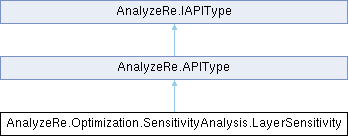 |
C# Client Library
A C# Client Library for the AnalyzeRe REST API
|
 |
C# Client Library
A C# Client Library for the AnalyzeRe REST API
|
One layer sensitivity parameters. More...
Public Member Functions | |
| virtual T | ShallowCopy< T > () |
Create a shallow copy of this object.
for a serializer-based copy method. | |
Protected Member Functions | |
| virtual void | AfterMembersCloned (APIType originalResource) |
| Invoked following construction if the current instance has been created using a member-wise clone of some other instance. Override if your derived APIType class contains some members that should not be cloned. | |
Properties | |
| OrderedDictionary | hist [get, set] |
| Normalized 20 bins histogram of the layer possible participation. Each bin is for a 5% range (0-0.05, 0.05-0.1, ..., 0.95-1. | |
| double | max [get, set] |
| Maximum possible layer participation. | |
| double | mean [get, set] |
| Average layer participation between all candidates. | |
| double | min [get, set] |
| Minimum possible layer participation. | |
| double | normalized_interquartile_range [get, set] |
| Normalized interquartile range of a layer participation. | |
| double | normalized_standard_deviation [get, set] |
| Normalized standard deviation of a layer participation. | |
| string | ref_id [get, set] |
| Layer reference ID. | |
One layer sensitivity parameters.
Definition at line 18 of file SensitivityAnalysis.cs.

|
inlineprotectedvirtualinherited |
Invoked following construction if the current instance has been created using a member-wise clone of some other instance. Override if your derived APIType class contains some members that should not be cloned.
Overriding implementations should be sure to invoke base.AfterMembersCloned().
A sane question for a code reviewer to ask might be: "Why not avoid copying those members in the first place?" The answer is that there is no framework-supported method of excluding members from a MemberwiseClone. The only officially supported solution is to not use the object.MemberwiseClone method at all and instead have each class implement it's own Copy method. In our case, most objects have no need to specialize their copy implementation (even though they could - the ShallowCopy<T> method is marked virtual). It's simpler to simply "correct" any special-case members after the fact, and requires less error-prone code than if the code were responsible for ensuring no members were missed in a copy. It's also faster than any reflection-based approach, even though such an approach could benefit from custom attributes meant to exclude certain members from copying.
Reimplemented in AnalyzeRe.APITypes.APIResource_WithDataEndpoint, AnalyzeRe.APIResourceView.BaseAPIResourceView, AnalyzeRe.Distributions.CustomDistribution, AnalyzeRe.LossSets.LossSet_WithData, AnalyzeRe.Optimization.Candidate, AnalyzeRe.Optimization.OptimizationView, and AnalyzeRe.StaticSimulation.
Definition at line 37 of file APIType.cs.
|
inlinevirtualinherited |
Create a shallow copy of this object.
for a serializer-based copy method.
If this object contains any members that reference the current object (this), the class should override this method to avoid cloning a reference to the old class.
Implements AnalyzeRe.IAPIType.
| T | : | IAPIType |
Definition at line 14 of file APIType.cs.
|
getset |
Normalized 20 bins histogram of the layer possible participation. Each bin is for a 5% range (0-0.05, 0.05-0.1, ..., 0.95-1.
Definition at line 54 of file SensitivityAnalysis.cs.
|
getset |
Maximum possible layer participation.
Definition at line 33 of file SensitivityAnalysis.cs.
|
getset |
Average layer participation between all candidates.
Definition at line 38 of file SensitivityAnalysis.cs.
|
getset |
Minimum possible layer participation.
Definition at line 28 of file SensitivityAnalysis.cs.
|
getset |
Normalized interquartile range of a layer participation.
Definition at line 43 of file SensitivityAnalysis.cs.
|
getset |
Normalized standard deviation of a layer participation.
Definition at line 48 of file SensitivityAnalysis.cs.
|
getset |
Layer reference ID.
Definition at line 23 of file SensitivityAnalysis.cs.